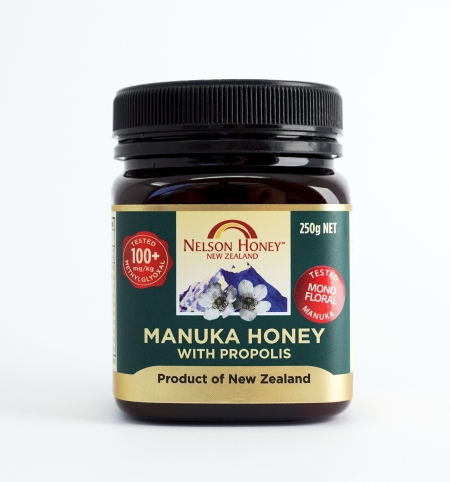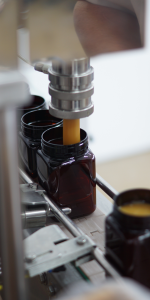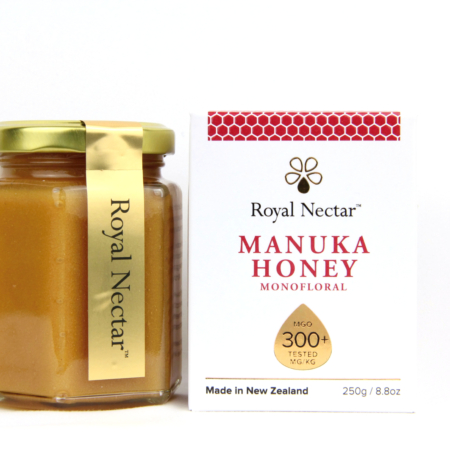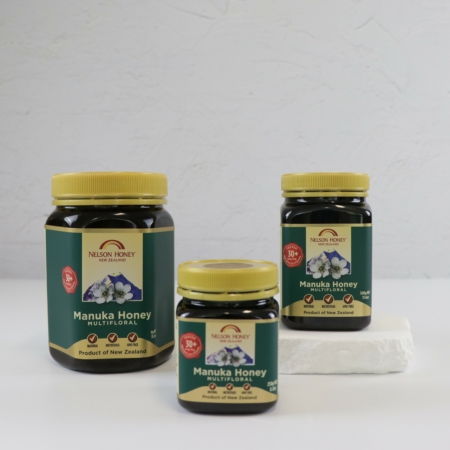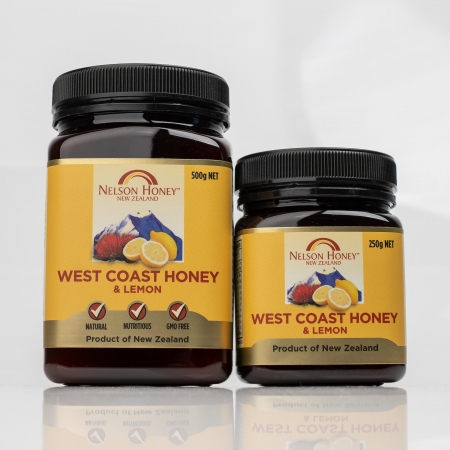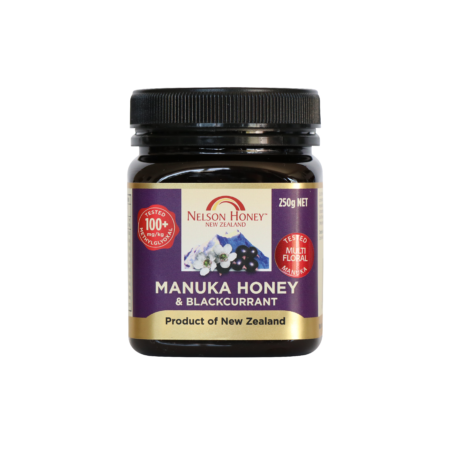Description
Nelson Honey’s Manuka Honey with added Propolis is a combination developed to bring you nature’s goodness.
Manuka honey is a monofloral honey collected by our honeybees from the Manuka flower. The honeybees collect and transform the nectar of the Manuka plant into honey by combining various digestive enzymes through a unique process.
Our naturally sweet Manuka Honey is sourced from pure, clean and unpopulated natural environments in remote parts of the top of the South Island of New Zealand – free of pollution, chemicals and other contaminants. This special quality of Manuka honey is very rare and we are proud to share it with the rest of the world!
Warning
Propolis may cause severe allergic reactions.
Batch Track
Here at Nelson Honey we believe in being transparent when it comes to our certifying the quality of our products. We have designed an in-house system called Batch Track, whereby every batch of Manuka Honey that is packed in our factory undergoes independent testing at different laboratories for and you can access the test results online. Our Batch Track system gives you peace of mind you have bought a quality jar of Manuka Honey.
Read more about what this means under the ‘science of honey’ tab on this page.
Please click here to check your batch and see the quality for yourself.
Natural ingredients
We pride ourselves on using natural ingredients in all our products so you can take advantage of all the natural goodness. Our Manuka Honey range only contains Pure New Zealand Honey sourced from pristine wilderness areas around the South Island and has added 1.56g Propolis extract, which is equivalent to 0.625g of fresh Propolis.
Size: 250g
Science of Propolis
Propolis varies between hives, districts and seasons. It is usually dark brown in color, but colour variations occur depending on available vegetation.
The environment also affects chemical composition. Propolis may contain – resins, balsams, waxes, essential oils, pollen and minerals.
How bees use Propolis
Bees make Propolis to seal cracks and repair other hive damage. Sealing cracks reduces the risk of disease and parasites entering the hive. The resinous nature of Propolis also makes it ideal for preventing putrefaction within the hive, e.g. small mice or lizards that might die in the hive can be sealed in in Propolis.
Propolis uses
Dried Propolis is scraped from hives and frames. The flakes may then be powdered for use or soaked to extract desired constituents. Propolis is used as an innovative preservative.
Antimicrobial activity of honey and Propolis products showed synergic effects, resulting in higher results than those of the base honeys and Propolis extracts.
Nelson Honey produces a range of Propolis products; Propolis Standardised Liquid Extract 20% in dropper and throat spray, and Manuka Honey 100+ MG with added Propolis Extract 1.56g.
Read More
Science of Honey
Honey has been used since ancient times for its special properties. Good quality honey can contain beneficial plant compounds including antioxidants. It contains high levels of glucose and fructose, a natural alternative to those wishing to avoid refined sugar. However, the composition of a honey batch depends on the floral source(s) available to the bees that produced the honey.
Nelson Honey operates a team of beekeepers and has hives located throughout the beautiful regions at top of the South Island of New Zealand. Hives enjoy spectacular and remote locations including Maori Bay in the Marlborough Sounds and Rainbow Station in St Arnaud.
Here at Nelson Honey we can trace our honey back to the hives they came from and our team of beekeepers maintain the health and happiness of all our bees.
Manuka Honey
There has been much research done on the components of manuka honey, leading to worldwide acclaim of this wonderful honey.
Manuka Honey is unique to New Zealand and its special benefits have been a traditional part of folklore throughout New Zealand’s settled history.
At Nelson Honey, we test all our Manuka Honey for MGO (Methylglyoxal) activity along with other chemical markers to ensure that it is authentic manuka honey. Methylglyoxal is expressed as a minimum number of mg/kg and scientific evidence has confirmed it as being a key compound that occurs naturally in Manuka honey.
Honeydew Honey
While Manuka Honey is extremely well-known for its special properties, our Honeydew Honey has some special characteristics. It contains complex sugars called Oligosaccharides.
|
Average Nutritional Value per 100 g
|
| Energy |
1,340 kJ (320 kcal) |
| Carbohydrates |
79.6 g |
| Fats |
0 g |
| Protein |
0.4 g |
| Water |
17.10 g |
| Riboflavin (vit. B2) |
0.038 mg |
| Niacin (vit. B3) |
0.121 mg |
| Pantothenic acid (B5) |
0.068 mg |
| Vitamin B6 |
0.024 mg |
| Folate (Vit. B9) |
2 μg |
| Vitamin C |
0.5 mg |
| Calcium |
6 mg |
| Iron |
0.42 mg |
| Magnesium |
2 mg |
| Phosphorus |
4 mg |
| Potassium |
52 mg |
| Sodium |
12 mg |
| Zinc |
0.22 mg |
Read More

